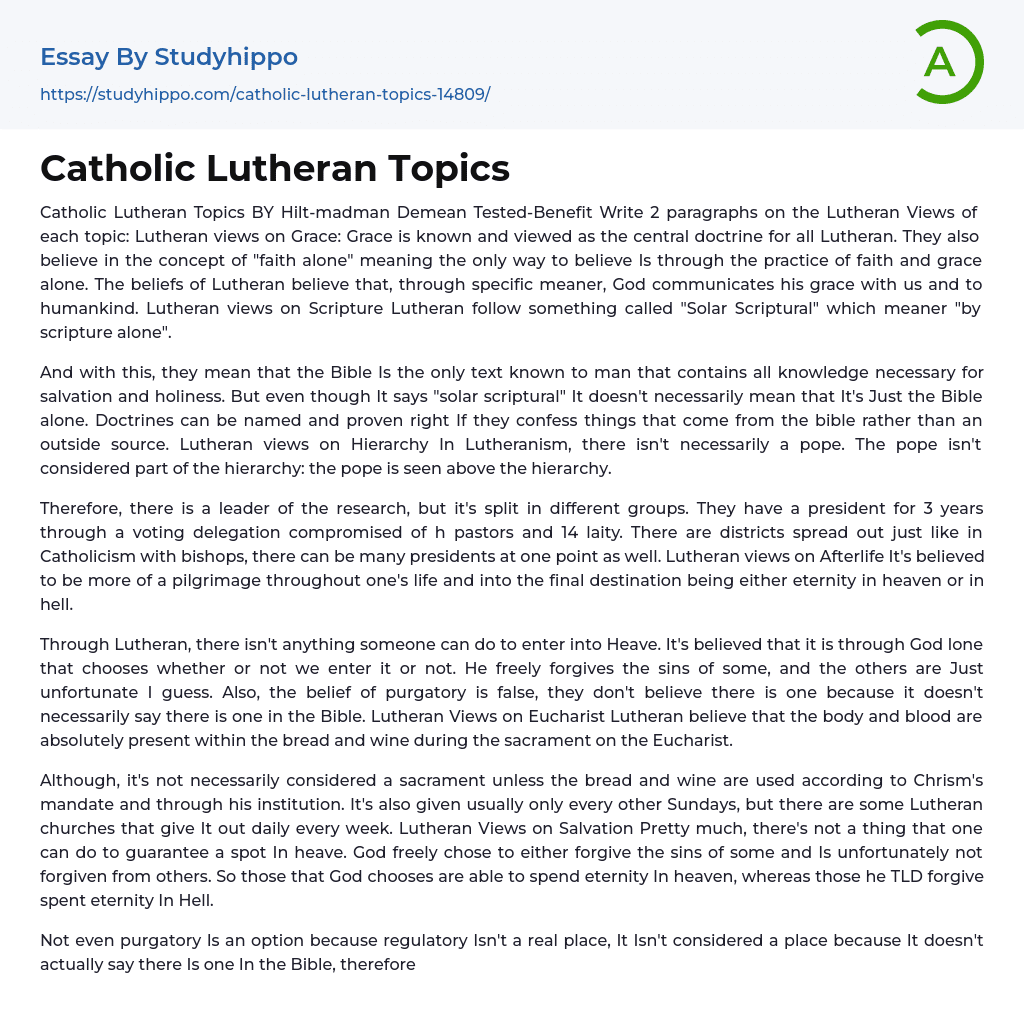Lutherans consider grace to be the central doctrine, which is conveyed by God through specific means. They also uphold the belief in "faith alone," meaning that belief is only possible through faith and grace. Lutherans recognize the Bible as the sole source of necessary knowledge for salvation and holiness, a concept known as "Sola Scriptura." However, they do not exclude other valid doctrines consistent with biblical teachings. Unlike Catholicism, Lutheranism lacks a Pope-like role and instead divides leadership among groups. Every three years, a president is elected by pastors and laity delegates. Lutheran districts have bishops similar to Catholicism, and there may be multiple presidents serving simultaneously.
Regarding the afterlife, Lutheran beliefs emphasize a lifelong pilgrimage leading to heaven or hell as the final destination. They reject the notion of Purgatory and believe that entr
...y into heaven is solely determined by God's choice. Forgiveness for sins is freely given to some individuals while denied to others.
Concerning the Eucharist, Lutherans hold that during this sacrament, the body and blood of Christ are truly present in the bread and wine if administered according to Christ’s mandate and institution.The frequency of the Eucharist varies among Lutheran churches; some offer it every other Sunday while others provide it daily.Regarding salvation,Lutherans believe that one cannot take any action to guarantee a place in heaven.
Salvation is derived from God's decision to forgive certain individuals, leading them to spend eternity in heaven, while those who are not granted forgiveness will endure eternity in hell. The Lutheran faith disregards the idea of purgatory since it lacks biblical references. Instead, Lutherans firmly adhere to the principles of "faith alone" and "sola scriptura,"
which assert that the Bible serves as their exclusive authoritative source for salvation and righteousness. However, they also ascertain the correctness of doctrines based on their alignment with biblical teachings rather than hierarchical authority. Although there is no specific mention of a leader within the Lutheran hierarchy, a voting delegation comprising pastors and laity exists within their structure. Similar to Catholicism, Lutheran districts possess bishops and can concurrently have multiple presidents. While some Lutheran churches observe communion weekly, this practice is not universally followed among all congregations. As per Lutheran beliefs, it is God's own choice that determines an individual's destiny of either salvation or damnation, resulting in eternal residence in heaven or hell. Some individuals receive forgiveness from God while others do not. Since purgatory finds no mention in the Bible, Lutherans do not recognize it as a genuine place or an option available to them.
- Baptism essays
- Holy Spirit essays
- Jesus Christ essays
- Adam And Eve essays
- Crucifixion Of Jesus essays
- Crusades essays
- Eucharist essays
- God The Father essays
- Pope essays
- Protestantism essays
- Christian essays
- Church essays
- Elizabeth essays
- Sacrament essays
- Catholic Church essays
- Lord essays
- Priest essays
- Protestant Reformation essays
- Business Law essays
- Contract essays
- Consumer Protection essays
- Property essays
- Ownership essays
- Agreement essays
- Common Law essays
- Contract Law essays
- Justice essays
- Security essays
- Tort Law essays
- United States Constitution essays
- Crime essays
- Lawsuit essays
- Treaty essays
- Family Law essays
- Marijuana Legalization essays
- Constitution essays
- War on Drugs essays
- Court essays
- Jury essays
- Police essays
- Protection essays
- Community Policing essays
- Criminal Law essays
- Judge essays
- Lawyer essays
- Employment Law essays
- Copyright Infringement essays
- Injustice essays
- Intellectual Property essays
- Breach Of Contract essays




